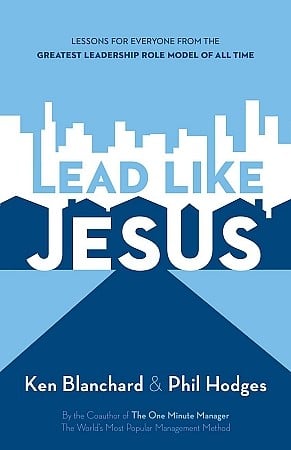
Lead Like Jesus by Ken Blanchard and Phil Hodges
The author of The One Minute Manager, Ken Blanchard, along with the co-author Phil Hodges, has written a book for Christian leadership entitled Lead Like Jesus. The book places very biblical perspective on the idea of leadership. The thesis of the book is that a servant leader should follow the example of the greatest servant leader – Jesus Christ.
Leadership is addressed, not only in an organizational context, but in a personal context. The opening chapter of the book reveals the various approaches to leadership, and then this author takes the notion that leadership should be “transformational.” Because Jesus transforms lives, Jesus should be our servant model.
The book reveals the nature of a servant leader in a holistic approach (heart, head, hands, and habits. Each chapter contains interactive elements such as a “pause and reflect” section, a set of summary questions, or a check-list for the reader to use in assessment of the reader’s leadership capabilities. The last chapter contains a set of tools (or tests) to assess how the reader can “lead like Jesus.”
Having read The One-Minute Manager in college, I was intrigued to find that Ken Blanchard had written a Christ-centered leadership book. The opening chapter helped me to understand his personal spiritual journey. I found that by Blanchard sharing his personals story helped me to accept his leadership principles that he was teaching in the book.
The idea of the “EGO” was a very useful explanation of the hermeneutic used by Blanchard and Hodges. Either a person is ego-centric, or God-centric in their view. With this presentation, I agree.
As a church planter, I found the learning stages (novice, apprentice, journeyman, and master) to be a useful tool in mentoring other leaders. I found his diagrams to be very helpful in introducing the leadership principles. For example, the EGO diagram (page 49) or the EGO factor in leader-follower relationships (page 141) both helped me to understand the concepts better.
The hermeneutical foundation of the book was sound. The author makes use of the Bible, not only in direct quotation, but by way of illustration. The basis of leadership for Blanchard is clearly a relationship with Jesus Christ. There were many leadership principles that were probably derived from his secular experience. The 80/20 rule for setting goals (page 97) is one such example. However, for the most part, Blanchard really tried to approach leadership with a Biblical mind-set. This is evident in the chapter on habits. He spends time sharing the basic habits of a servant leader, and these habits are the foundation of any Christian.
I wholeheartedly agreed with many of the principles laid out in this book. I found this book a enjoyable read and as a result, I did not have points of departure or disagreement. The idea that any person can have some level of leadership is something with which I agree. Blanchard tries to apply leadership principles to anyone in any context, as long as they are followers of Jesus Christ. I would hope that this book can be used in the church to help most disciples to be better leaders. I found that this book would work real well in training new leaders in a church planting context.












